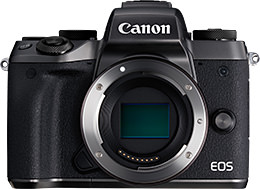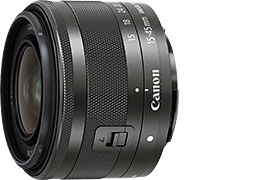EOS M5 Review Part 3: A Closer Look at New and Updated Operational Features
Canon has just released its mirrorless flagship model, the EOS M5. Part 3 of this review focuses on the much-talked-about new features as well as updated ones. In particular, we take a closer look at the built-in electronic viewfinder, DIAL FUNC. button, maximum ISO speed and Panning function. (Reported by: Kazuo Nakahara)

*This review was done with a prototype, which may differ in external appearance from the actual product.
TOPIC 1: Built-in electronic viewfinder
The EOS M5 comes with a built-in electronic viewfinder, an addition which I am very excited about as it allows me to concentrate better on the subject. When I look through the viewfinder, I somehow have a stronger urge to produce a better shot. The built-in electronic viewfinder has an approximately 2.36-million-dot organic electroluminescent display (OLED) panel which delivers very vivid colours. Also, the blackout time of the viewfinder is short, and I had the impression that the image feed during continuous shooting was quite seamless.
The electronic viewfinder comes in particularly handy in scenes where it is hard to see the image on the rear LCD monitor, such as in backlight or when photographing outdoors. Located along the same optical axis as the lens, the electronic viewfinder allows you to compose a shot naturally in the same way as a DSLR camera. With an eyepoint of 22mm, the four corners of the image are clearly visible even when I look through it with my glasses on.
There are four different ways of displaying information inside the electronic viewfinder. “Display 1” superimposes the information with a part of the displayed image, while “Display 2” displays the setting information outside the image. In addition, each display mode allows you to display the image in the vertical or horizontal orientation, so you can choose a display format according to your shooting style.
Selectable viewfinder display format

Display 1

Display 2

Display 1

Display 2

EOS M5/ EF-M15-45mm f/3.5-6.3 IS STM/ FL: 15mm (equivalent to 24mm in 35mm format)/ Aperture-priority AE (f/5.6, 1/60 sec., EV-0.7)/ ISO 400/ WB: Auto
In this example, backlight shining into the building created a strong contrast in the brightness. Using the electronic viewfinder reduced the glare of the sunlight and helped me to identify the subtle colour tones of the setting sun.
TOPIC 2: DIAL FUNC. button
The most significant change in the controls of the EOS M5 is the use of the DIAL FUNC. button for setting the functions. Pressing the DIAL FUNC. button displays a rolling selection of the parameter at the bottom of the screen. The settable parameter is indicated in an orange frame. You can set the ISO speed and white balance in the default setting.


Each press of the [DIAL FUNC.] button toggles to the next parameter like a rolling selection.

You can now set the Customs Controls under “Custom Functions” to “Not Assigned”, “ISO speed”, “White balance”, “Metering mode”, “AF method” or “Drive mode”.
TOPIC 3: Maximum ISO speed of 25600
Thanks to the powerful noise-reduction capabilities of the DIGIC 7 image processor, ISO 25600 is now one of the native ISO speed settings. This helps to widen the scope of your photographic expression considerably – not only can you capture handheld shots at a dark location with almost no light, handheld night snapshots are also possible even when using a narrow aperture setting.

EOS M5/ EF-M15-45mm f/3.5-6.3 IS STM/ FL: 15mm (equivalent to 24mm in 35mm format)/ Aperture-priority AE (f/16, 1/8 sec., EV±0)/ ISO 25600/ WB: Auto
I took this handheld street photo at night with the aperture narrowed to f/16. There is very little luminance noise even at an ISO speed of 25600. While a certain amount of noise is inevitable at such a high level of sensitivity, the depictive power is nonetheless excellent with details such as the outline of the buildings and reflection in the wet road surface remaining clearly identifiable.
Click here for more details about the DIGIC Image Processor
TOPIC 4: New Panning function
The Panning function automatically selects the optimal shutter speed by analysing the panning speed of the camera and the speed of the subject. It is added to the SCN modes, and the effect can be adjusted to one of the three levels: Max., Med. or Min. Subject blur can be reduced when you are using an IS lens that supports this function.
Lenses compatible with Panning function
EF-M18-150mm f/3.5-6.3 IS STM
EF-M15-45mm f/3.5-6.3 IS STM (firmware update needed)

Select Panning function from the SCN modes.
Receive the latest updates on photography news, tips and tricks by signing up with us!

EOS M5 (Body)

EF-M15-45mm f/3.5-6.3 IS STM

Born in Hokkaido in 1982, Nakahara turned to photography after working at a chemical manufacturing company. He majored in photography at the Vantan Design Institute and is a lecturer for photography workshops and seminars, in addition to working in commercial photography. He is also a representative of the photography information website studio9.

A monthly magazine that believes that enjoyment of photography will increase the more one learns about camera functions. It delivers news on the latest cameras and features and regularly introduces various photography techniques.
Published by Impress Corporation

































